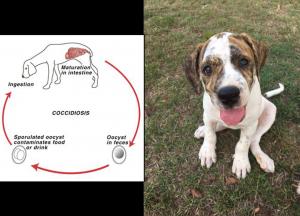Uhunt
Coccidiosis
Uhunt Mag Information
- Posted By : BRISTLE UP
- Posted On : Jun 29, 2019
- Views : 3425
- Category : PIG DOGGING » VET & HEALTH ARTICLES
- Description : "Parvo look alike! "
Overview
- By Bec Holt & Bella Jaye
EDITORS NOTES
Getting a new pup is always an exciting time. It’s very easy to get excited and forget the risk bringing a pup in can cause to your other dogs. I got a new pup, she seemed super healthy and happy but luckily I noticed she had diarrhea and blood, immediately I thought she had the start of parvo, even though she was vaccinated. I went into panic mode and took her straight to the vet, after doing a lot of tests to make sure I found out she had Coccidiosis. I gave some oral medication from the vet, in 2 days she was back to normal.
WHAT IS IT ?
Coccidiosis is the condition caused by a parasitic infestation of one celled organisms in the gut. It most commonly affects very young, or immunocompromised animals. There are multiple types of Coccidia, and most of the time hosts aren’t affected by their presence. When Coccidiosis is apparent, it presents in the same way regardless of the actual strain causing the illness. Coccidiosis cannot be communicated to humans.
WHAT TO LOOK FOR
The most obvious symptom will be diarrhea. It may start as soft stools but if left untreated will progress to watery or mucousy stools and may have blood present. In more severe cases patients may also vomit, have loss of appetite, become dehydrated and be lethargic. By this stage, if left untreated, suffering dogs can die. Due to the diarrhea, Coccidiosis can often be confused for Parvo however is far easier to treat.
HOW DOES IT HAPPEN?
Dogs who are adversely affected by Coccidia tend to have weaker immune systems, they may be young, old, be suffering from other diseases or perhaps are going through some stress. Puppies aren’t born with Coccidia present in their gut, but contract it from the faeces of those already infected. In mature hounds the immune system is stronger and often learns how to handle the parasites unassisted, but in the weakened systems or those in puppies who have never been exposed before, the Coccidia can multiply unchecked which causes the illness. Time from initial exposure to symptoms is typically 2 weeks.
DIAGNOSIS,TREATMENT & PREVENTION
In any case of a dog having ongoing diarrhea, it needs to be seen to by a vet promptly because dehydration kills fast. It is also very sensible to quarantine any animals who are showing symptoms or that were in direct contact until a diagnosis is reached. Once at the clinic, the vet can do a faecal assessment, which easily shows the organisms present in the stool. From there the patient may be kept for treatment in serious cases, while others can be treated at home. The animal will need to be rehydrated either orally or through IV fluids and they will be administered a medication to treat the infestation. From there, a two week follow up will be needed to confirm recovery. To help prevent Coccidia spreading, diagnosed dogs should be quarantined, strict hygiene measures should be in place at home at all times, and dogs’ movements on and off properties should be controlled to reduce the risk of introduction to the home environment.
